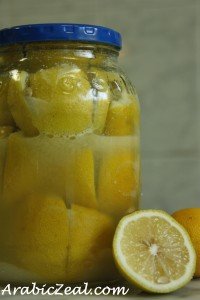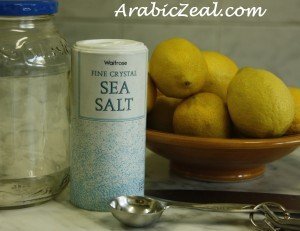Preserved Lemons ~ A Distinctive Flavor in Moroccan Cooking
 Lemons are present in some form in practically every Arabic meal. The Moroccans take it a step further by using preserved lemons in their cooking, which give a refreshing tangy flavor to many of their dishes.
Lemons are present in some form in practically every Arabic meal. The Moroccans take it a step further by using preserved lemons in their cooking, which give a refreshing tangy flavor to many of their dishes.
Imagine a very intense, incredibly flavorful lemon zest, but silky and fragrant. Preserved lemons retain all of their lemony-ness even when slow cooked in a tagine. Essential in a Moroccan kitchen, they are used in salads and dressings, in lamb and vegetable tagines, and as a garnish. Preserved lemons are the star ingredient of the well-known Moroccan dish Chicken Tagine with Lemons and Olives.
Not to be confused with dried lemons (which are darkened and hard), preserved lemons keep their vibrant yellow color. Basically they are lemons pickled in salt. Normally cooks use the peel alone and discard the pulp, but you can use the pulp, too, if desired.
The unique texture and flavor of preserved lemons cannot be substituted with fresh lemon. Don’t even try. However, you can easily prepare preserved lemons at home. But here’s the catch: they require at least a month to mature before they’re ready to use. So, if you’d like to use them in your cooking, you’ll need to plan ahead. Way ahead.
Preserved Lemons – What you’ll need
1 large sterilized jar with tight-fitting lid
10 lemons (unwaxed, preferably organic) or as many that will squeeze into your jar
10 Tablespoons sea salt or kosher salt, (Not iodized table salt), 1 T for each lemon
Fresh lemon juice, as needed
Method:
1. Wash, scrub, and dry lemons. For each lemon: cut the tips off. Standing each lemon vertically, cut the lemon into quarters, but don’t cut all the way through. Leave about a half-inch uncut.
3. Stuff one tablespoon sea salt into each lemon.
4. One by one, stuff the lemons into the jar. The lemons will soften and release their juices, making it possible to pack them in. Pack them down and squeeze in as many as you can.
5. If the jar is fully packed, the juice from the lemons should nearly fill the jar. Add some additional fresh lemon juice if necessary. It’s important that all the lemons are covered with the salted lemon juice. Leave some airspace before sealing the jar.
6. Store in a cool dark place or the refrigerator for at least a month. The longer they are left, the better the flavor. To use, scoop out and discard the pulp. Rinse the lemon peel under water to get rid of the salt. Chop finely, in slivers, or as instructed. Preserved lemons can be used for up to a year.
Question: How do you use preserved lemons in your cooking?



 Follow
Follow
This is a great recipe for preserved lemons…I love make Chicken tagine at home…tho always have to rush to Carefour to pick up the lemons…sometime they run out of them…This would be grt way to have them handy at home:))
Thanks for sharing..
Hi Shy, I have never seen preserved lemons at Carrefour. Must not have looked hard enough … Meanwhile, I’m curious about your Chicken tagine. I’m working on a recipe for that. Thanks for the comment. Happy cooking. 🙂
I’m never without a jar of these at home – as you say, they last for ages (I keep them in the fridge due to our climate here) and they add a certain magic to many dishes especially salads. Great instructions.
Hi Sally, you are my cooking guru. Yes, I keep the preserved lemons in the fridge, too. I will try to add them to a green salad. Great idea.
After(after a month) chopping and slivering the peel do you put them back in the jar and use them with the juice?
Hi Ansar,
I keep them whole in the jar and just sliver them as needed. I hope that helps.
Hi Holly
Thank you for your recipe for preserved lemons. I use a lot of lemons in my cooking. I have never worked with preserved lemons before but they sound delicious and can’t wait to try them. 🙂 I eat a lemon a day too!!!
I’m a new wxpat in Sharjah and I teach English.
HI Zenaida, Yes, lemons are wonderful. 🙂 You need a lot of patience with this one. You have to wait to use the lemons. All the best to you. 🙂
Could I use the iodized table salt? Or the preserved lemons will not work if I use it?
HI Jessica,
That is a good question.
Most recipes call for sea salt or kosher salt and say to avoid the iodized table salt.
I would follow that advice. It’s good to have sea salt in the kitchen for cooking.
Thanks for stopping by. Holly